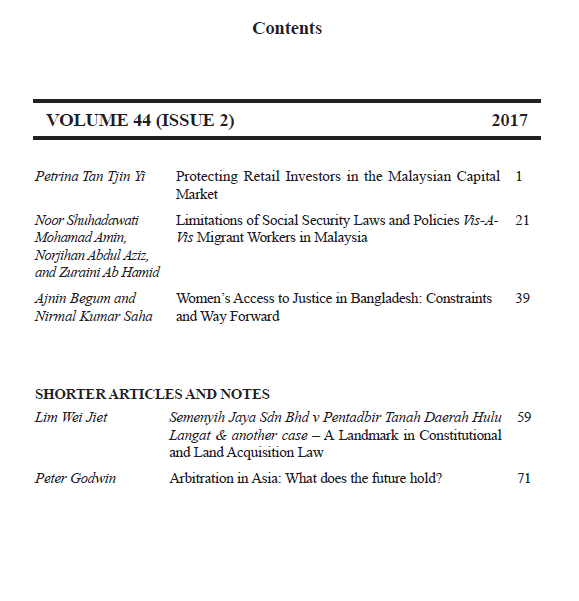Limitations of Social Security Laws and Policies Vis-A-Vis Migrant Workers in Malaysia
Keywords:
social security, limitations, migrant workers, malaysiaAbstract
On the basis of the standards established by the international legal regimes and the principle of equality of treatment which is enshrined in the Federal Constitution, it is argued that the social security laws enforced in Malaysia are discriminatory vis-a-vis migrant workers. This is because the country has two different laws governing national workers and migrant workers in the case of employment injury. Under these laws, the benefits provided to migrant workers are inadequate and inequitable because they are inferior to the benefits offered to national workers. Furthermore, the invalidity benefit which is received by national workers is not made available to migrant workers. The old-age benefit introduced by the national provident fund is unfair to migrant workers because their contribution is not made compulsory and their employer’s contribution is very low as compared to the benefit enjoyed by national workers. Additionally, the portability of the social security rights from Malaysia to migrant workers’ home country fail to be enforced due to lack of coordination through bilateral and multilateral agreements between countries. Hence, this research seeks to analyse the employment injury schemes under the Employees’ Social Security Act 1969 (ESSA) available to national workers and workmen compensation scheme under the Workmen’s Compensation Act 1952 (WCA) available to migrant workers. Further, this research also attempts to investigate the savings for retirement age provisions under the Employees’ Provident Fund Act 1991 (EPFA) specifically for migrant workers and other policy issues such as portability of social security rights and overlapping of ministerial responsibilities. These shortcomings make a strong case for extending social security rights to migrant workers in Malaysia on the basis of equality.



